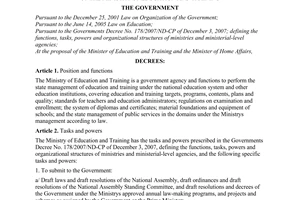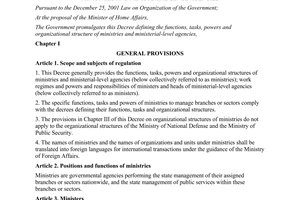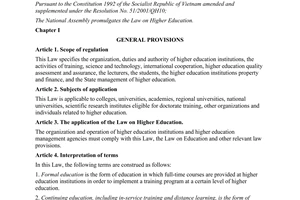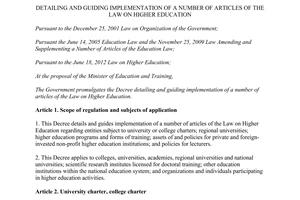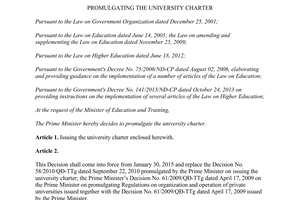Nội dung toàn văn Circular No. 07/2015/TT-BGDDT training program for university level master’s level and doctorate level
|
THE MINISTRY OF
EDUCATION AND TRAINING |
SOCIALIST
REPUBLIC OF VIETNAM |
|
No.: 07/2015/TT-BGDDT |
Hanoi, April 16th, 2015 |
CIRCULAR
PROMULGATING THE REGULATION ON MINIMUM AMOUNT OF KNOWLEDGE, REQUIRED CAPACITY OF GRADUATES AT EACH TRAINING LEVEL OF HIGHER EDUCATION AND PROCEDURES FOR ESTABLISHMENT, APPRAISAL AND ISSUANCE OF TRAINING PROGRAM FOR UNIVERSITY LEVEL, MASTER’S LEVEL AND DOCTORATE LEVEL
Pursuant to the Law on Higher Education dated June 18th, 2012;
Pursuant to the Decree No. 36/2012/ND-CP dated April 18th, 2012 by the Government defining the functions, tasks, entitlements and organizational structure of Ministries and ministerial-level agencies;
Pursuant to the Decree No. 32/2008/ND-CP dated March 19th 2008 by the Government defining the functions, tasks, powers and organizational structure of the Ministry of Education and Training;
Pursuant to the Decree No. 141/2013/ND-CP dated October 24th, 2013 by the Government providing guidance on the implementation of a number of articles of the Law on Higher Education;
Pursuant to the Decree No. 141/2013/ND-CP dated October 24th, 2013 by the Government providing guidance on the implementation of a number of articles of the Law on Higher Education;
At the request of Director of Department of Higher Education,
The Minister of Education and Training promulgates the Circular regulating the minimum amount of knowledge, required capacity of graduates at each training level of higher education and procedures for establishment, appraisal and issuance of training program for university level, master’s level and doctorate level.
Article 1. Enclosed herewith the regulation on minimum amount of knowledge, required capacity of graduates at each training level of higher education and procedures for establishment, appraisal and issuance of training program for university level, master’s level and doctorate level.
Article 2. This Circular comes into effect from June 01st 2015.
The Decision No. 2677/GD-DT dated 03/12/1993 by the Minister of Education and Training promulgating the regulation on structure and minimum amount of knowledge for training at university level and regulations in other documents relating to the provisions of this Circular are annulled.
Article 3. The Chief officers, Director of Department of Higher Education; Heads of concerning units affiliated to the Ministry of Education and Training; Directors of national universities, regional universities, institutes; Rectors of universities, Director of Research Institutes eligible for providing doctoral training and relevant agencies, organizations, and individuals are responsible for implementing this Circular./.
|
|
THE
MINISTER |
REGULATIONS
ON
MINIMUM AMOUNT OF KNOWLEDGE, REQUIRED CAPACITY OF GRADUATES AT EACH TRAINING
LEVEL OF HIGHER EDUCATION AND PROCEDURES FOR ESTABLISHMENT, APPRAISAL AND
ISSUANCE OF TRAINING PROGRAM FOR UNIVERSITY LEVEL, MASTER’S LEVEL AND DOCTORATE
LEVEL.
(Enclosed with the Circular No. 07/2015/TT-BGDDT dated April 16th
2015 by the Minister of Education and Training)
Chapter I
GENERAL PROVISIONS
Article 1. Scope of regulation
This document provides for minimum amount of knowledge, required capacity of graduates applicable to each training level of higher education and procedures for establishment, appraisal and issuance of training program for university level, master’s level and doctorate level.
Article 2. Regulated entities
This regulation applies to national universities, regional universities (including educational institutions affiliated to national universities/regional universities), institutes, universities, research institutes eligible for providing doctoral training (hereinafter referred to as training institutions) and relevant agencies, organizations and.
Article 3. Interpretation of terms
In this regulation, these terms can be construed as follows:
1. Credit means a unit of study.
a) A credit includes at least 15 theory credit hours and 30 credit hours of self-study and self-preparation with guidance; other includes 30 credit hours of practice, experiment and discuss and 15 credit hours of self- study and self-preparation with guidance; or includes 45 periods of internship, thesis, coursework or graduate thesis;
b) A credit hour is equivalent to 50 minutes of study.
2. The minimum amount of knowledge for a higher education level is the number of compulsory credits that a student must earn at such level, excluding the credits from courses in Physical education and National security education.
3. Training program is a system of theoretical knowledge and practice that is suitable for the methods of teaching, studying and evaluating to ensure that students earn necessary knowledge and skills at specific level of higher education.
4. Outcome standard is the required knowledge, skills, attitudes and sense of occupational responsibility a student shall obtains when he/she complete the training program that the training institution has undertaken and published as well as conditions for implementation.
5. Capacity of graduates means the capability of individual-work and team-work on the basis of occupational safety, professional ethics and enthusiasm; including knowledge, skills, self-motivation and creativity in solving the issues relating their disciplines/specialities and training levels.
Chapter II
MINIMUM AMOUNT OF KNOWLEDGE, REQUIRED CAPACITY OF GRADUATES AT EACH TRAINING LEVEL OF HIGHER EDUCATION
Article 4. Minimum amount of knowledge at each level of higher education
Minimum amount of knowledge at different levels of higher education is specified as follows:
1. University level: 120 credits. Regarding disciplines with training duration of 5 or 6 years, the minimum amount of knowledge is equivalent to 150 credits or 180 credits.
2. Master’s level: 60 credits. Regarding disciplines/specialities at university level with minimum amount of knowledge of 150 credits or more, the minimum amount of knowledge for master’s level is 30 credits.
3. Doctoral level: 90 credits for holders of master’s degrees and 120 credits for university graduates.
Article 5. Required capacity of graduates at each level of higher education
Apart from general requirements for professional ethics, the compliance with regulations on occupational safety, the political sophistication level and national security knowledge according to current regulations and have basic skills information technology according to current regulations on Standard of skills in using information technology issued by the Ministry of Information and Communications, graduates at each level of higher education shall satisfy the following required capacity:
1. Regarding university level
a) Knowledge:
Have deep knowledge in the speciality; grasp thoroughly techniques and have practical knowledge to be able to solve the complicated work; have foundation knowledge of basic principles, natural and social rules in the speciality to develop new knowledge and continue the study at a higher level; have management and environmental protection skills and knowledge of legislation relating to their speciality;
b) Skills:
Have a skill enabling them to complete complicated work that requires the flexible application of theory and practical knowledge of their speciality in different situations; have skills enabling them to analyze, synthesize and assess the data and information, collect opinions and use new achievement in technological science to solve the real or abstract problems in their speciality; have professional leader ship to solve problems in an area or a region;
Have foreign language skills that enable them to understand main ideas of a report or a speech about a common topic in work relating to their speciality; to use foreign language to express and deal with common technical situations; to write a simple report presenting opinions concerning the professional work;
c) Autonomy and responsibility:
Have leadership in their speciality; have creativity during the performance of tasks; have self-orientation capacity and adaptability to different working environment; have ability to study and gain knowledge and experience themselves to increase their professional skills; have ability to reach conclusion about common professional issues and some complicated technical issues; have ability to draw up plans, direct and develop teamwork effectiveness; have ability to assess and innovate professional activities in medium scale.
2. Regarding master's level
a) Knowledge:
Have ability to control professional knowledge enabling them to take on work for a specialist; have critical thinking; have professional specialized knowledge to develop new knowledge and continue the research at the doctoral level; have collective knowledge about legal regulations, management and environmental protection relating to their speciality;
b) Skills:
Have necessary skills to complete complicated work that is casual, irregular, unpredictable; have skills of independent researching to develop and test the new remedies and develop new technologies in their speciality;
Have foreign language skills enabling them to understand a report or a speech on most topics concerning their speciality; have ability to use foreign language in most of common technical situations; have ability to make report relating to their professional job; have ability to present clearly their opinions and criticize a technical issues in foreign language;
c) Autonomy and responsibility:
Have ability to discover and deal with issues relating to their speciality and offer valuable suggestions; have ability to orient and develop personal capacity themselves to adapt the working environment with high competitiveness and professional leadership; have ability to give professional conclusion about complicated issues relating to their speciality; have ability to defend and take responsibilities for their professional conclusion; have ability to establish or check and grant appraisal of plans; have ability to develop teamwork effectiveness on management and professional activities; have ability to assess and decide the development of the assignment; have professional leadership to deal with big problems.
3. Regarding doctoral level
a) Knowledge:
Have a knowledge system that is intensive and advanced concerning their speciality; have a creative and independent thinking; have ability to control key values in learning; have ability to develop the principles and theory concerning their speciality; have collective knowledge in terms of legislation, management and environmental protection; have advanced thinking in organization of professional work and researching to deal with complicated issues;
b) Skills:
Have necessary skill to discover and analyze complicated issues and offer creative solutions to deal with the problems; have ability to create new professional knowledge; have ability to build up a national and international cooperative network concerning their speciality; have synthesizing ability and leadership to deal with issues with regional and international scale;
Have foreign language skills to understand the complicated reports about both concrete and abstract problems, including the academic exchange in terms of their speciality. Have ability to communicate and exchange academe fluently by foreign language with native speakers. Have ability to write scientific reports and professional reports; have ability to explain their opinions about an issue and analyze their viewpoint about the choice;
c) Autonomy and responsibility:
Have ability to discover and deal with problems themselves, find out principles and rules during business dealings and offer valuable ideas and ability to assess the value of the ideas; have ability to adapt the international integration environment; have the leadership and influence to the strategic orientation of the collectives; have ability to offer the idea of the top expert with reliable foundation about science and reality; have ability to give decision about plans on operation and management of the research and development of new knowledge, new ideas and new procedures.
Chapter III
PROCEDURES FOR ESTABLISHMENT, APPRAISAL AND ISSUANCE OF TRAINING PROGRAM AT UNIVERSITY, MASTER’S AND DOCTORAL LEVEL
Article 6. Procedures and organization of training program
1. Procedures for formulation of training program
a) Step 1: Conduct surveys, determine human resources demands according to levels and training disciplines/specialities; conduct survey on demands of employers towards graduates and required knowledge and capacity of graduates specified in Articles 4 and 5 of this Regulation;
b) Step 2: Formulate general objectives, specific objectives and outcome standards of training program;
c) Step 3: Determine the structure, necessary amount of knowledge for training program, establish training program ensuring the training objective and outcome standards;
d) Compare the training program with training program at same levels, same disciplines/specialities of other Vietnamese and foreign training institutions to complete the training program;
dd) Step 5: Design the course outline according to the determined training program;
e) Step 6: Organize conference to collect suggestions of lecturers, administrative officers of the training institution or other institutions, the scientists, representatives of relevant employers and the graduates (if any) on training program;
g) Step 7: Complete the draft of training program depending on the suggestions collected from relevant parties and request the Council of science and education of the training institution to consider carrying out the procedures for appraisal and applying the program;
h) Step 8: Conduct assessment and update regularly the subject contents and teaching methods according to the advance of the speciality and requirements of employment.
2. Organization of training program
a) Director of universities/institutes; Rectors of universities; Director of Research Institute eligible for providing doctoral training (hereinafter referred to as Director of the training institution) shall arrange the affiliated academic departments to carry out the activities specified in Points a and h Clause 1 of this Article and issue the decision on establishment of curriculum-designing team depending on the request of Head of affiliated academic departments to carry out the activities specified in Point b, c, dd, e, g Clause 1 of this Article;
b) Members of curriculum-designing for a discipline/speciality shall be people who are expert in such discipline/speciality and capable of establish and develop training program, including: representatives of relevant academic departments, representatives of registrar offices, lecturers specialized in the discipline/speciality, scientists, educating experts and other relevant people according to the requirement of the discipline/speciality and representatives of enterprises/agencies using employees in such discipline/speciality. Director of the training institution shall decide the requirements and quantity of members of the curriculum-designing team.
Article 7. Procedures for appraisal and issuance of training programs
1. Director of the training institutions shall issue the decision on establishment of Training program appraisal council (hereinafter referred to as the Appraisal council) at the request of the Council of science and education. Standards and structures of the Appraisal council:
a) The Appraisal council shall include at least 5 members who are professors, associate professors, doctor expert on the discipline/speciality conformable to the program subject to appraisal; in which at least 1 representative of the employers; members of the curriculum-designing team shall not participate in the Appraisal council. Training institutions are encouraged to invite reputable lecturers from foreign universities to participate in the appraisal council;
If there is not any representative for the employers is qualified to participate in the Appraisal Council, a person who has completed a 3-year Master's program with a Master’s degree of the same discipline and has at least 5 years' experience in the speciality of training program may be invited as a member of the Appraisal council of university level or master’s level;
b) The Appraisal council shall include the President, a Secretary and some members including 02 opponent members working for 2 different training institutions. The training institution having program subject to appraisal shall not participate or appoint only 1 person to participate in the Appraisal council;
If the program subject to appraisal concerns a new discipline/speciality which is not included in the training program of any establishment in Vietnam , the Appraisal council shall include qualified people in similar specialities that have conducted research and declared at least 1 one scientific work relating to the program subject to appraisal (excluding the representatives of the employers).
2. Appraisal of training program
a) The Appraisal council shall depend on the current regulations on training applicable to the corresponding levels; the current provisions on training program; requirements of training discipline/speciality and the defined objectives and/or outcome standards to conduct appraisal of the program;
b) Contents of the session of the Appraisal council shall be recorded in a detailed minute containing the result of the vote about the conclusion of the Appraisal council that is signed by members of the council;
c) The conclusion of the Appraisal council shall include one of the following contents: The Council ratifies the training program without request for adjustment or, The Council ratifies the training program but adjustments shall be made (the contents subject to adjustment shall be specified) or, The Council refuses to ratify the training program (the explanation shall be contained).
3. Director of the training institution shall sign the decision on issuance of training program on the basis of the request of the science and training council; publish the training program, objectives, outcome standards of the training program and requirements for running the program on website of the training institution.
Article 8. Procedures for updating and assessing the training program
1. Procedures for updating/assessing the training program
a) Step 1: Draw up plan on updating/assessing the training program;
b) Step 2: Collect information and evidences concerning the necessity for updating training program (the adjustments within the regulation of the state and the training institution about training program; the new advances in the discipline/speciality; the socio-economic issues and research findings relating to the training program; the response of the concerning parties; the adjustment in course contents, subjects contents or professional contents...);
c) Step 3: Conduct assessment and build up the report on the effectiveness of the training program (the compliance with the defined outcome standards and objectives; the unity among the program contents, the assessing methods and materials for studying and teaching…); compare the research findings on the requirements for development of training program and the compliance with the training program; anticipate the impact of the adjustment/update of training program;
d) Step 4: Prepare the contents subject to adjustment and/or updating and request the Science and training council to consider ratifying;
dd) Step 5: The science and training council consider and ratify the adjusted/updated contents of the training program and request the Director of the training institution to issue the adjusted training program. In case of necessary the Science and training council shall decide the appraisal of the adjusted training program according to the regulations in Article 7 of this Regulation.
2. Assessment of the training program
a) At least every 2 years, Head of academic departments of the training institution shall conduct assessment of the training program according to the regulations in Clause 1 of this Article (step 1 to step 4). The preparation of contents of the training program subjects to adjustment/updating shall comply with the regulations in Article 6 of this Regulation or shall follow a more simple procedures, depending on the amount of adjustment/updating;
b) Director of the training institution shall issue the adjusted training program according to the suggestions of the science and training council when the training program has been assessed according to the regulation in Clause 1 of this Article.
Chapter IV
IMPLEMENTATION, INSPECTION AND ACTIONS AGAINST VIOLATION
Article 9. Organization of implementation
1. Directors of training institutions shall organize the implementation of the regulations in this Circular concerning the minimum amount of knowledge and required capacity of graduates at each training level; promulgate the outcome standard for each training program.
Regarding required foreign language capacity, Directors of the training institutions may apply the general regulations in this Circular or apply the 6-grade framework of reference for foreign languages applicable to the Vietnamese enclosed with the Circular No. 01/2014/TT-BGDDT dated January 24th 2014 by The Ministry of Education and Training corresponding to the required foreign language capacity for each training level in this Circular. In case a Vietnamese student wants to learn language of an ethnic minority or a foreign student wants to learn Vietnamese instead of a foreign language, Director of the training institution shall consider and give decision according to conditions of the training institution.
2. Directors of training institutions shall inspect and assess the current training programs; issue the training programs according to the regulations in this Circular before January 01st 2016.
3. Directors of training institutions shall comply with the regulation on procedures for establishment, appraisal and issuance of training program, ensuring the quality of training program; provide specific regulations for the contents in this regulation according to requirements of the levels, training disciplines/specialities and conditions of training institutions.
Article 10. Inspection
1. Training institutions shall conduct internal inspection and self-assessment of the implementation of the regulations in this Circular concerning the minimum amount of knowledge and required capacity of graduates at each training level and regulations on establishment, appraisal and issuance of training programs according to the regulations in this Circular.
2. The Ministry of Education and Training shall conduct inspections of the implementation of the regulations in this Circular at training institutions.
Article 11. Actions against violations
1. Any training institutions that commits a violation against this Regulation shall be incurred administrative penalties and incurred other legal liabilities according to current regulations depending on the nature and severity of the violations. Any training institutions that commits a violation against the regulations in Point a Clause 2 of this Article shall incur a suspension of admission for 12 months; if such institution repeats the violation, the decision on opening of the discipline shall be revoked.
2. Directors of training institutions and people who directly commit violations shall be disciplined in the following cases:
a) The minimum amount of knowledge and required capacity of graduates at specific training level is not ensured;
b) Procedures for establishment, appraisal and issuance of training programs are not followed;
c) Documents proving the implementation of regulations in this Circular are not retained;
d) Regulations in this Circular are not fully complied with./.
------------------------------------------------------------------------------------------------------
This translation is made by LawSoft and
for reference purposes only. Its copyright is owned by LawSoft
and protected under Clause 2, Article 14 of the Law on Intellectual Property.Your comments are always welcomed
